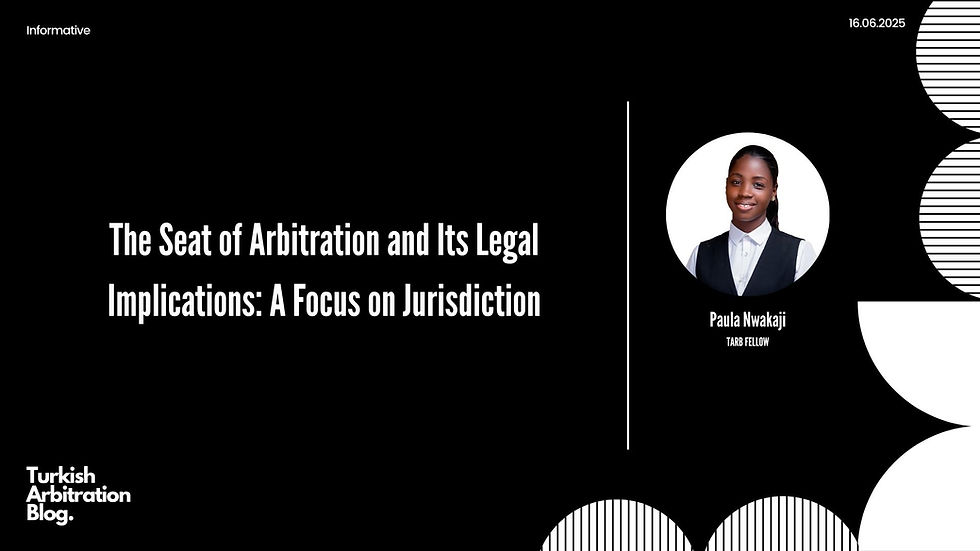THE SEAT OF ARBITRATION AND ITS LEGAL IMPLICATIONS: A FOCUS ON JURISDICTION
- arbitrationblog
- Jun 16, 2025
- 6 min read

I. INTRODUCTION
At the center of most discussions surrounding international arbitration, is the subject of the seat of arbitration. The seat of arbitration is a fundamental factor that determines the legal framework to govern the arbitration process. Given its role in shaping the fate of the arbitration proceedings, selection of the Seat has significant implications for parties involved, particularly regarding jurisdiction. In this article, we shall explore the concept of the seat of arbitration, dissect its legal significance and examine how choice of a seat influences jurisdictional questions.
II. WHAT IS THE SEAT OF ARBITRATION?
The ‘seat of arbitration’ also known as the place of arbitration is the location selected by the parties as the legal place of arbitration, which consequently determines the procedural framework of the arbitration.[i] It represents the jurisdictional location where arbitration hearings, deliberations and award-winning occur. Alastair describes the seat of arbitration as ‘a legal construct, not a geographical location.[ii] In essence, the seat does not necessarily refer to the physical location where parties meet to conduct proceedings – such could be in Singapore, Beijing, or conducted over Zoom – but rather the country whose procedural laws (lex arbitri) govern the arbitration.
To clarify:
§ The venue of arbitration refers to the physical location of the hearings
§ The seat refers to the legal jurisdiction.
Essentially, the decision of a seat should not be an afterthought. Thus, when drafting arbitration clauses, it is pivotal for parties to consider jurisdictions that are neutral and possess clear arbitration legislations together with minimal court intervention.
III. WHY THE SEAT OF ARBITRATION MATTERS?
The implications of choosing a seat are manifold. A chosen seat of arbitration plays a vital role in the following ways:
1. Governing law of the arbitration procedure
The most immediate legal impact of the seat is that it determines the procedural law governing the arbitration. This includes the rules about appointment and challenge of arbitrators, interim measures, setting aside awards, conduct of proceedings, confidentiality obligations (in some jurisdiction) and the extent to which the courts can intervene.
For instance, an arbitration seated in Paris will be governed by the French Code of Civil Procedure – despite that the underlying contract is governed by English law. This means any challenge to the award, or request for court assistance, must be brought before the French court.
2. Court jurisdiction and supervisory power
Courts at the seat of arbitration have the supervisory jurisdiction over the arbitration. This includes the power to appoint arbitrators when parties cannot agree, decide on challenges to arbitrators, grant interim measures, set aside or annul awards rendered in that jurisdiction. This supervisory power makes the court at the seat the “home court” of the arbitration. Under Article I (1) of the 1958 New York Convention on the Recognition and Enforcement of Foreign Arbitral Awards, the determination of whether an award is foreign depends on the seat. Hence, all other national courts – whether in place of enforcement or elsewhere – are considered foreign courts with much more limited powers.
3. Ground for challenge or Annulment
One of the most critical implications relates to annulment proceedings. Only the courts at the seat have the power to set aside an arbitral award.
Why does this matter? Because if an award is annulled at the seat, enforcement in other countries may be denied under Article V(1)(e) of the New York Convention. While some jurisdiction (example France) might still enforce annulled awards under narrow exception, in practice, an annulment at the seat can be fatal to enforcement efforts elsewhere.
Thus, choosing a seat in a pro-arbitration jurisdiction is vital for minimizing the risk of rogue judicial interference.
IV. SOME GLOBAL LEADING ARBITRATION SEATS
Globally, there are a number of leading seats and jurisdictions with modern, sophisticated and arbitration-friendly legislation. Some of these seats include;
1. London, England
London is reputed for having a strong legal infrastructure and an arbitration-friendly judiciary. The jurisdiction is home to the London Court of International Arbitration (LCIA). The law governing most arbitrations conducted in London is the newly enacted Arbitration Act of 2025 which repealed the 1996 edition. An award made by a tribunal in England and Wales or Northern Ireland can be enforced in the UK in the same way as a court order or judgment.
2. Singapore
Singapore is prominent for housing the Singapore International Arbitration Centre (SIAC) which is considered one of the top choices for business that operate in Asia region. In both surveys conducted by Queen Mary University of London and White & Case International Arbitration in 2021 & 2025 respectively, the SIAC maintains its position as the second most preferred arbitral institution globally. To sustain its efficiency and flexibility in arbitral process, the SIAC introduced a new set of Rules which became effective from 1 January, 2025. Like most jurisdictions, Singapore has ratified the New York Convention; therefore, an arbitral award made in Singapore is enforceable in most other jurisdictions.
3. New York and Washington, D.C., USA
Arbitrations seated in New York are governed either by the New York Civil Practice Law and Rules, or by the Federal Arbitration Act (FAA). Both statues provide similar procedures for compelling arbitration and staying court litigation for disputes that are arbitrable. Fee charges and related costs at arbitrations seated in New York are generally split between the parties, subject to the parties expressly agreeing how the costs are to be borne. Arbitration institutions active in the USA include the American Arbitration Association (AAA), JAMS and the CPR Institute for Dispute Resolution. To ensure the confidentiality of proceedings, most arbitration institutions in the United States have set rules[iii] that guide against disclosing confidential information of the dispute.
4. Paris, France
Arbitration proceedings seated in France are governed by articles 1 the French Code of Civil Procedure. Domiciled in the city of Paris is the International Chamber of Commerce (ICC) International Court of Arbitration. An important feature of French arbitration legislation is a strong emphasis on party autonomy. The French courts are actively supportive of arbitration, and refuse to intervene in any dispute where an arbitration clause exists. Hence, courts such as the Paris Civil Court (Tribunal de Grande Instance) and the Paris Court of Appeal have been established to exclusively hear all applications relating to the appointment of arbitrators or the commencement of arbitral proceedings as well as all proceedings relating to international arbitration
5. Hong Kong
Hong Kong is home to one of the widely recognized arbitration institutions in the world – the Hong Kong International Arbitration Centre (HKIAC). The Centre specializes in administering arbitrations, adjudications, and mediations. According to a surveys, the HKIAC is ranked the third most preferred arbitral institutions worldwide. To keep up with growing needs of arbitration procedure, the HKIAC published a new set of Administered Arbitration Rules which took effect from 1st June, 2024. The new Rules introduced provisions that encourage parties to take diversity into account during arbitrator appointment process and also the requirement for tribunal to consider environmental impact when conducting arbitration procedures. In general, the Rules of HKIAC emphasizes party autonomy in the conduct of arbitration.
V. CASE LAWS IN SUPPORT OF SEAT OF ARBITRATION
Dallah v. Pakistan [2010] UKSC 46
An arbitration seated in Paris resulted in an award against Pakistan. Dallah sought enforcement in the UK. The UK courts scrutinized the jurisdiction of the tribunal independently, as the seat (France) did not govern the enforcement forum (UK). This case illustrates that courts outside the eat may still review jurisdictional issues when enforcing awards.
PT First Media v. Astro [2013] SGCA
This case highlighted the principle that only courts at the seat can annul an award. When Astro sought to enforce a Malaysian-seated award in Singapore, the Singapore courts refused enforcements even though the award had not been annulled in Malaysia. The decision reinforced the importance of using set-aside procedures at the seat.
VI. CONCLUSION
The seat of arbitration remains a foundational pillar of arbitration architecture. It links the arbitral process to a national legal system and frames the procedural rules of the game. Thus, when drafting arbitration clause, it is important for parties for clearly choose a place where the arbitration can legally live. Because, where it lives determines its protection or potential to be challenged.
ABOUT THE AUTHOR
The author is a dispute resolution enthusiast who enjoys exploring and researching trends in the arbitration industry. She holds an LLB degree from Rivers State University, Nigeria and is currently student member of the Young ICCA. Beyond academic and career endeavors, she enjoys networking and volunteering her time in mentorship.
[i] “Seat of Arbitration” (Jus Mundi, 2023) https://jusmundi.com/en/document/wiki/en-seat-of-arbitration
[ii] Henderson, Alastair. “Lex Arbitri, Procedural Law and the Seat of Arbitration.” SAcLJ 26 (2014): 886
[iii] For example, Article 27 of the ICDR rules provides that confidential information disclosed during the proceedings shall not be divulged by an arbitrator or the administrator.




Comments